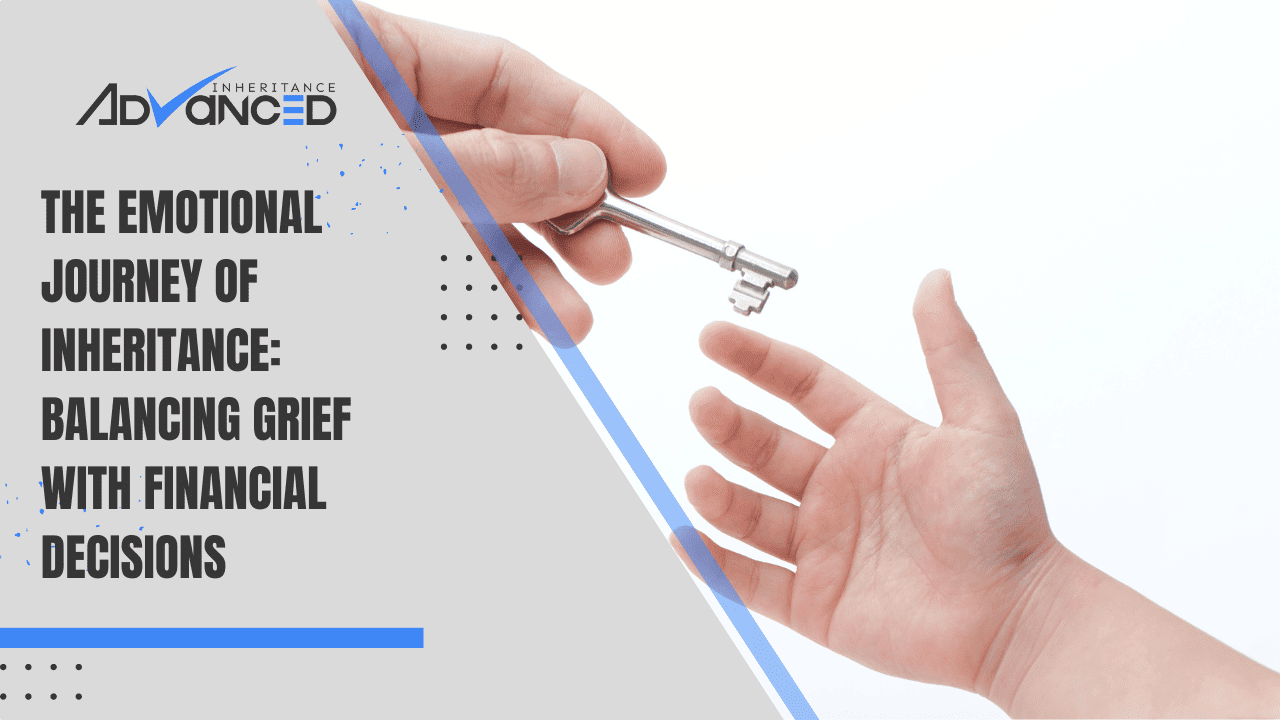Inheritance, often regarded as a symbol of financial security and the fulfillment of one’s legacy, can also be a journey marked by profound emotions. It is a juncture where the realms of financial decisions and the human experience converge. As beneficiaries navigate the complex landscape of asset transfers, estate planning, and financial responsibilities, they must simultaneously grapple with the emotional weight of loss, memories, and change. Let’s explore how to navigate this difficult transition and the importance of having the right support available to help you manage your inheritance.
The Intersection of Emotion and Finance
The emotional impact of inheritance is unique to each individual. No matter what range of emotions you feel, they are likely to have an impact on your decisions, so it’s important to have a solid plan in place for dealing with the financial aspects of your inheritance.
Dealing with an inheritance almost always comes at a time when emotions are heightened due to the loss of a loved one. It is an intersection where grief, gratitude, guilt, and relief converge, often creating a profound emotional experience. Understanding and navigating these emotions is as vital as managing the financial aspects that follow.
Understanding the Emotional Impact of Inheritance
Expect to feel a range of emotions from grief and sadness to gratitude when it comes to inheritance. There is no right or wrong way to feel, but it is important to give yourself the time you need before making important legal decisions.
Grief and Loss
Whether an inheritance comes after the loss of a family member or close friend, it signifies the departure of someone dear. Grief is a natural response to loss, and it can manifest in various ways:
- Sadness and Melancholy: Feelings of sadness, longing, and nostalgia are common during this time.
- Regret and Guilt: Some beneficiaries may grapple with feelings of regrets or guilt, wondering if they could have done more or said something different.
- Relief: In some instances, particularly if the deceased had been suffering, beneficiaries might experience a sense of relief that their loved one is no longer in pain. This relief can coexist with grief and is a valid emotional response.
Gratitude
Alongside grief, many beneficiaries experience a profound sense of gratitude. Inheritances often represent the culmination of a lifetime of hard work, sacrifice, and financial planning by the deceased. This gratitude may be accompanied by a sense of responsibility:
- Honoring the Legacy: Beneficiaries may feel a duty to honor the legacy of the deceased by preserving and responsibly managing the inherited assets.
- Stewardship: Managing newfound wealth or assets can feel like a significant responsibility. There may be concerns about making wise financial decisions and ensuring that the inheritance benefits not just the individual but also future generations.
Financial Decisions
It’s essential to recognize that grief may cloud your judgment or lead to impulsive choices. To balance the emotional and financial aspects of inheritance effectively:
- Give Yourself Time: Avoid making major financial decisions immediately after a loss. Allow yourself the time and space to process your emotions and gain clarity before making important choices.
- Consult Professionals: Lean on financial advisors, attorneys, or estate planners who can provide objective guidance and help you navigate the complexities of inheritance.
- Communicate: Open and honest communication with family members and beneficiaries is crucial. Discussing your feelings, intentions, and concerns can prevent misunderstandings and conflicts down the road.
Financial Responsibilities
While the emotional aspects of inheritance often take center stage, there is an undeniable financial dimension that accompanies the receipt of assets, properties, and wealth.
Managing Assets
One of the primary financial responsibilities of inheritance is the effective management of the assets received. This involves making decisions about:
- Investments: Determining how to invest or manage the inherited funds to preserve and potentially grow their value over time.
- Property: Maintaining and, if necessary, selling or renting inherited real estate properties.
- Taxes: Understanding and addressing any tax implications related to the inheritance, including capital gains tax, estate tax, and income tax.
- Debts: Settling any outstanding debts or obligations left by the deceased, such as mortgages or outstanding loans.
Balancing Grief with Financial Decision-Making
The emotional impact of grief can significantly influence financial decisions. Here’s how to strike a balance:
- Acknowledge your emotions, but try to make significant financial decisions when you’re in a calmer state of mind.
- Rely on financial advisors, estate planners, and attorneys to provide expert guidance.
- Avoid feeling overwhelmed by breaking down financial responsibilities into manageable tasks. Prioritize what needs immediate attention and what can wait.
- If you’re not the sole beneficiary, open and honest communication with other family members is crucial. Discussing financial plans and decisions can prevent conflicts and misunderstandings.
Planning for the Future
Inheritance often prompts individuals to consider their own financial futures more closely. This is an ideal time to:
- Review your own estate plan, including wills, trusts, and beneficiaries, in light of your newfound assets and financial situation.
- Define your financial goals and aspirations, considering both short-term needs and long-term objectives.
- Meet with financial advisors who can help you create a financial plan that aligns with your goals and values.
Common Inheritance Scenarios
In the intricate world of inheritance, no two situations are identical. Each inheritance comes with its unique set of circumstances, assets, and challenges. Let’s explore some common inheritance scenarios that beneficiaries often encounter, and offer some insights and strategies to help you plan for the future.
In this segment of our series, we delve into some common inheritance scenarios that beneficiaries often encounter. By exploring these scenarios, we aim to provide insights and strategies for handling the complexities of inheritance effectively.
The Family Home
One of the most common and emotionally charged inheritance scenarios involves the family home. Here are some considerations:
- The family home often holds significant sentimental value. Beneficiaries may have fond memories associated with it, making decisions about its future particularly emotional.
- Managing the family home may come with financial responsibilities, including maintenance, property taxes, and potential renovation costs.
- If multiple beneficiaries are involved, determining the fate of the family home can be challenging. Options include selling, renting, or allowing one beneficiary to buy out the others.
Sibling Dynamics
Inheritances can sometimes strain sibling relationships. Common challenges include:
- Siblings may have differing views on how to distribute assets or make financial decisions.
- Ensuring an equitable distribution of assets can be challenging, especially when there are various types of assets involved.
- Open and honest communication is vital to resolving disputes and ensuring that everyone’s concerns are addressed.
Managing Investments
Receiving a substantial portfolio of investments can be both a blessing and a challenge. Considerations include:
- Beneficiaries may have varying risk tolerances. Deciding how to manage the portfolio while considering individual preferences is essential.
- Understanding the tax implications of investment decisions is crucial to optimizing returns.
- Many beneficiaries seek the expertise of financial advisors to help manage and diversify their investment portfolios.
Business Ownership
Inheriting a family business carries its unique set of responsibilities:
- Operational Decisions: Deciding whether to continue operating the business or sell it can be complex, involving factors like market conditions, financial viability, and personal interest.
- Succession Planning: If multiple family members are involved, succession planning is essential to ensure a smooth transition.
- Legal and Financial Considerations: Legal and financial aspects of business ownership must be carefully managed to protect the business’s value and assets.
Charitable Bequests
Some inheritances include bequests to charitable organizations:
- Honoring Wishes: Beneficiaries may feel a deep sense of responsibility to honor the deceased’s charitable intentions.
- Research and Selection: Choosing the right charitable organizations and causes requires research and consideration.
- Tax Benefits: Understanding the tax benefits of charitable giving can be advantageous in optimizing the impact of donations.
Guidance For Your Inheritance
At Inheritance Advanced, we’re here to help you navigate your inheritance journey, from estate planning to asset distribution. Knowledge is power when it comes to inheritance law, and our team of experts is always ready to provide guidance and support. Whether you need help managing an estate or securing an advance on your inheritance, or figuring out how to use the money from your advance, we’re here to help.
Remember, every situation is unique, and what works best for one person may not work as well for another. Always seek professional advice when dealing with estate matters. Contact us today at Inheritance Advanced to learn more about how we can assist you with your financial planning needs.









